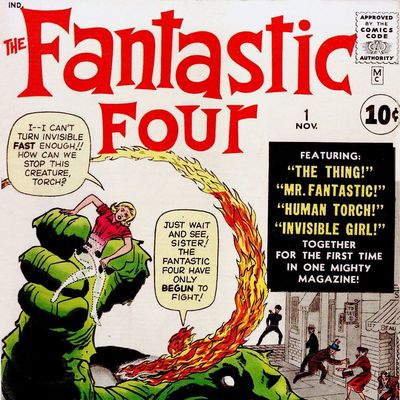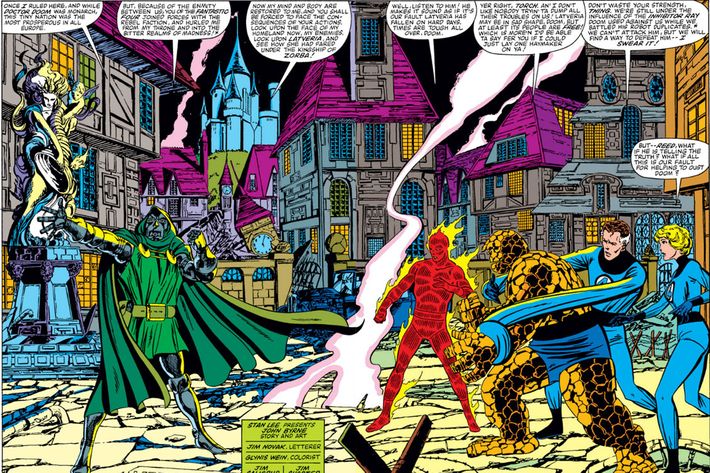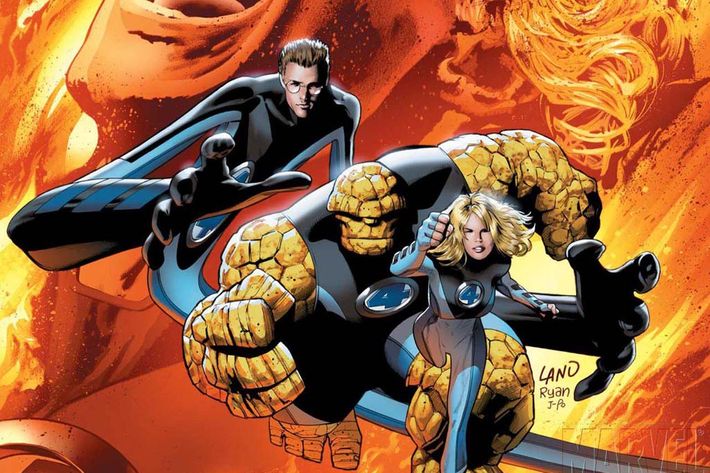
Marvel Entertainment has done what Dr. Doom, the Skrulls, and even the world-devouring might of Galactus couldn’t do: killed the Fantastic Four.
During a Sunday-afternoon panel at New York Comic-Con, Marvel editor in chief Axel Alonso and current Fantastic Four writer James Robinson confirmed what observers had suspected for months: the company is closing up shop on its longest-running series after a world-changing 53-year run. The news has been met with a collective shrug of resignation among the comics community, but attention should be paid. This is no small event in the history of superheroes. It’s a premature ending, and it was most likely borne of the comics economy’s worst tendencies in the age of blockbuster superhero flicks.
A rep for Marvel said the company has no comment on the reasoning for Fantastic Four’s cancellation. But a glance at the Fantastic Four’s licensing situation starts to tell a very plausible (and disappointing) story leading to the end of the series. Before the superhero-movie renaissance, a struggling Marvel sold the FF’s film rights (along with those of the X-Men) to 20th Century Fox at terms very favorable to Fox. Fast-forward to now: Fox is rebooting the Fantastic Four film franchise and Marvel gets hardly any money out of the movie, unlike the insane cash it makes on flicks made by its own studio (Avengers, Captain America, and the other titles in that universe) and the Spider-Man franchise (owned by Sony, who cut a good bargain with Marvel a while back). Reports have long circulated that Marvel Entertainment CEO Ike Perlmutter despises Fox for not playing ball, much less returning its various properties to Marvel.
The X-Men have become so essential to the Marvel Comics universe that Marvel would never do mass cancellations of its various X-titles (although there’s periodic speculation that Marvel is trying to somehow minimize X-Men characters). But the Fantastic Four only star in one monthly series, ever since their second series got canceled a few months ago. Sales of the book have been decent, but not spectacular. They’re an easy target in the war between Fox and Marvel. With the new Fantastic Four movie on the way in the next few months, Marvel has very noticeably taken FF characters out of its promotional materials.

And now, with little fanfare, the series is on the chopping block. We don’t know the specifics of how the so-called first family of the Marvel Universe will disappear, and it seems likely that at least some of the characters might remain in published Marvel series. For all we know, the series could be back sometime in the near future. But everything we know about the wrap-up of the series indicates a near-total end to the FF’s adventures. Robinson said the team is “going away for a while” and alluded to killing off characters in an interview. Marvel made no effort to assure fans that the FF will still show up in other titles. The final story line will be called “The End Is Fourever.” A solicitation for the collected edition of the story line describes it as “the closing act on the First Family of the Marvel Universe.” Combine all of that with the business disputes, and it all adds up to a pretty stark picture.
Let’s step back from the business specifics for a moment and mourn. The Fantastic Four are the defining characters of Marvel’s superhero universe. They’re its foundation stone and its guiding light. From the team’s first appearance in Fantastic Four No. 1 in 1961 until the present day, they’ve been relevant and worthwhile — and very often revolutionary. Let’s look at just three reasons why it’s tragic that the series is getting killed so blithely.
First of all, without the Fantastic Four, we wouldn’t have the Marvel universe or any of its characters. No Spider-Man, no X-Men, no Iron Man, nothing. Prior to the FF’s creation, Marvel Comics was in a death spiral. Long gone was its World War II–era heyday (during which it wasn’t called Marvel, but leave that be for the moment), when it created Captain America and the Sub-Mariner. Writer and editor Stan Lee was on the verge of quitting comics when his publisher told him to create a series about a team of superheroes — something their rivals at National (later to be DC) Comics had done with some success. So Lee and fellow comics veteran Jack Kirby, the legendary penciler, cooked up a team of four ordinary humans who, after being exposed to strange space radiation, gain powers of invisibility, elasticity, strength, and flame. They put out an issue and it flew off the racks. Marvel was saved, and the Marvel Era of comics began. The book set the template and the tone for an insanely fruitful period of creation. Within a few years, Lee, Kirby, and a few other compatriots dreamed up most of the characters and teams you’ve loved on the big screen. Nothing like that period has existed in comics before or since, and it all happened because of the Fantastic Four.
Second, the ideas behind the Fantastic Four were as beautiful as they were game-changing. Prior to that, the most popular superheroes were generally confident, beautiful, and successful members of society. But the Four were dysfunctional and, in many ways, freakish. When they got their powers, the team was horrified and confused, and the after-effects were ambiguous. Ben Grimm, known as the Thing, was the best example: The accident left him with a permanent exoskeleton of orange rock, meaning he could no longer walk in daylight without being branded as a freak. He was no Superman, embracing his powers and acting as a gleaming symbol of hope. He hated himself and what he’d become and struggled to do the right thing in a world that feared him. And the FF were a family, with all the drama that comes along with any family: Reed Richards (the elastic-bodied Mr. Fantastic) and Sue Storm (the self-explanatory Invisible Girl) were romantically involved (and soon, married) and would get into heated arguments; Johnny Storm (the flaming and flying Human Torch) was an attention hog who perpetually squabbled with Grimm. On top of all that storytelling, the series was also drawn with a stew of colorful costumes, sci-fi-heavy action, and apocalyptic imagery that had never been cooked up in the comics medium before. Nothing would ever be the same.

And perhaps most important, the FF haven’t lost their relevance. To put it bluntly: This is an execution, not a mercy killing. I’ve been talking about the historical importance of the early Fantastic Four issues, but that’s only the beginning of the team’s significance. It has a core idea that never gets old: the struggles, compromises, joys, and agonies of being in a family. Over the ensuing five decades of the team’s history, their adventures and tribulations have produced some of superhero comics’ greatest story lines and characters. There was the Galactus Saga of 1966, in which a massive alien visitor almost devoured the Earth, giving us the highest-stakes comics story ever told to that point (and giving us Galactus, who’s been used to great effect dozens and dozens of times ever since). Or writer/artist John Byrne’s incredible run in the early 1980s, which fleshed out Sue Storm and introduced heartbreaking conflicts between her and Reed over work-life balance and gender roles in a marriage. Or Mark Millar’s gripping and horrifying Ultimate Fantastic Four, an alternate-reality tale from the 2000s about a younger FF facing truly horrifying threats. Or Jonathan Hickman’s run from the early 2010s, or Matt Fraction’s run on Fantastic Four and its short-lived spinoff series FF just two years ago. The list goes on and on.
With any luck, at least some of the characters will continue to pop up occasionally in other Marvel books. And who knows, maybe the upcoming Fantastic Four movie will do so well that Marvel will think it can make lots of money through comics sales, due to rekindled interest. But the first family’s days at center stage are likely done for the foreseeable future. In Marvel’s defense, Fantastic Four sales haven’t been spectacular as of late. But there are a ton of titles that do way worse and aren’t getting nixed, much less in the run-up to a major movie release.
There’s been a nice running motif in Hickman’s recent run on New Avengers that holds no small amount of irony now. The series has prominently featured Reed Richards as he joins a cabal of other Marvel heroes to avert a total collapse of the cosmos. Repeatedly, the series revisits a meeting Richards led with the cabal, in which he gave the following rationale for their mission: “Everything dies. You. Me. Everyone on this planet. It’s inevitable and I have come to accept it. What I find unacceptable is the unnatural acceleration of that end.” He could very easily be talking about the real-world chronicle of his family’s revolutionary adventures.

